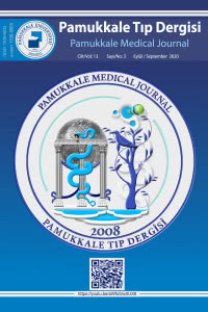Akut romatizmalateş tedavisinde aspirine bağlı hepatotoksisitenin değerlendirilmesi.
aspirin, çocuk, hepatotoksisite
Evaluation of aspirin-induced hepatotoxicity in the treatment of acute rheumatic fever.
aspirin, children, hepatotoxicity,
___
- 1. Karthikeyan G, Guilherme L. Acute rheumatic fever.Lancet 2018;392:161-174. doi:10.1016/S0140-6736(18)30999-1 2. Zühlke LJ, Beaton A, Engel ME, et al.Group A Streptococcus, Acute Rheumatic Fever and Rheumatic Heart Disease: Epidemiology and Clinical Considerations. CurrTreat Options Cardiovasc Med2017;19:1-23 doi:10.1007/s11936-017-0513-y 3. Dajani AS, Ayooub E, Bierman FZ, et al. Special Writing Group of the Committee on Rheumatic Fever, Endocarditis and Kawasaki Disease of the Council on Cardiovascular Disease in the Young the American Heart Association. Guidelines for the diagnosis of rheumatic fever. Jones criteria, 1992 update. JAMA 1992;268:2069-2073. 4. Gewitz MH, Baltimore RS, Tani LY, et al. Revision of the Jones criteria for the diagnosis of the rheumatic fever in the era of Doppler echocardiography: a scientific statement of the American Heart Association. Circulation 2015;131:1806-1818. doi:10.1161/CIR.0000000000000205 5. Demirbağ R, Sade LE, Aydın M, Bozkurt A, Acartürk E. The Turkish registry of heart valve disease. Turk Kardiyol Dern Ars 2013;41:1-10. doi:10.5543/tkda.2013.71430 6. Turgut NH, Söylemezoğlu T. Aspirinin hepatotoksik etkisi ve Reye sendromu. Cumhuriyet Tıp Derg 2011;33:125-132. 7. Nydick I, Tang J, Stollerman GH, Wroblewskı F and Ladue J.S. The influence of rheumatic fever on serum concentrations of the enzyme glutamic oxaloacetic transaminase. Circulation 1955;12:795-806. doi:10.1161/01.cir.12.5.795. 8. Prescott LF. Hepatotoxıcıty Of Mild Analgesics. Br J Clin Pharmac 1980;10:373-379. 9. Manso C, Nydick I and Taranta A. Effect of aspirin administration on serum glutamic oxaloacetic and glutamic pyruvictransaminases in children. Proc SocExp Biol Med 1956;93:84-88. doi:10.3181/00379727-93-22671 10. Olgun H, Bulgan M, Ceviz N, Yolcu C, Sahin IO, Laloglu F. Incidence of Aspirin-Related Hepatotoxicity in Pediatric Cases with Acute Rheumatic Fever. 51st Annual Meeting of the Association for European Paediatric and Congenital Cardiology (AEPC). Cardiology in the Young 2017;27:73-74. doi:10.1017/S1047951117000373. 11. Larrey D. Drug-induced liver diseases. J Hepatol 2000;32:72-78. doi:10.1016/S0168-8278(00)80417-1. 12. Benson GD. Hepatotoxicity following the therapeutic use of antipyretic analgesics. Am J Med 1983;14:85-93. doi:10.1016/0002-9343(83)90237-1. 13. Bernstein BH, Singsen BH, Kinng KK, Hanson V. Aspirin induced hepatotoxicity and its effect on juvenile romatoid artritis. Am J Dis Child 1977;131:659-663. doi:10.1001/archpedi.1977.02120190053012 14. Miller JJ, Weissman DB. Correlations between transaminase concentrations and serum salicylate concentrations in juvenile rheumatoid artritis. Arthritis Rheum 1976;19:115-118. doi:10.1002/art.1780190121 15. Athreya BH, Moser G, Cecil HS, Myers AR. Aspirin induced hepatotoxicity in juvenile rheumatoid arthritis: A prospective study. Arthritis Rheum 1975;18:347-352. doi:10.1002/art.1780180409. 16. Singh H, Chugh JC, Shembesh AH, Ben-Musa AA, Mehta HC. Hepatotoxicity of high dose salicylate therapy in acute rheumatic fever. Ann Trop Paediatr 1992;12:37-40. doi:10.1080/02724936.1992.11747544 17. Hamdan JA, Manasra K, Ahmed M. Salicylate-induced hepatitis in rheumatic fever. Am J Dis Child 1985;139:453-455. doi:10.1001/arcpedi.1985.02140070027021 18. Güngör Ş, Doksöz Ö, Fettah A, Nacaroğlu HT, Örün UA, Karademir S. Akut romatizmal ateş tanısı ile izlenen hastaların geriye dönük olarak değerlendirilmesi: Beş yıllık tek merkez deneyimi. İzmir Dr. Behçet Uz Çocuk Hast. Dergisi 2014;4:87-96. doi:10.5222/buchd.2014.087 19. Karademir S, Oğuz D, Senocak F, Ocal B, Karakurt C, Cabuk F. Tolmetin and salicylate therapy in acute rheumatic fever: Comparison of clinical efficacy and side-effects. Pediatr Int 2003;45:676-679 doi:10.1111/j.1442-200x.2003.01801.x 20. Ekici F, Kale Y, Kocabaş A. Akut romatizmal ateşin değişen yüzü;klinik gözlemlerimiz. Anadolu Kardiol Derg. 2013;13:506. doi:10.5152/akd.2013.157 21. Zimmerman HJ. Effect of aspirin and acetaminophen on the liver. Arch Intern Med 1981;141:333-342. doi:10.1001/archinte.1981.00340030065013 22. Fry SW, Seef LB. Hepatotoxicity of analgesics and anti-inflammatory agents. Gastroenterol Clin North Am 1995;24:875-905. 23. Gitlin N. Salicylate hepatotoxicity: The potential role of hypoalbuminemia. J Clin Gastroenterol 1980;2:281-285. 24. Kortsalioudaki C, Taylor RM, Cheeseman P,Bansal S, Mieli-Vergani G, Dhawan A. Safety and efficacy of N-acetylcysteine in children with non-acetaminophen-induced acute liver failure. Liver Transpl 2008;14:25-30. doi:10.1002/lt.21246 25. Singh S, Hynan LS, Lee WM. Improvements in hepatic serological biomarkers are associated with clinical benefit of intravenous N-acetylcysteine in early stage non-acetaminophen acute liver failureDig Dis Sci 2013;58:1397-1402. doi:10.1007/s10620-012-2512-x.
- ISSN: 1309-9833
- Yayın Aralığı: 4
- Başlangıç: 2008
- Yayıncı: Prof.Dr.Eylem Değirmenci
İsmail İSTEMEN, Ali ARSLAN, Ali İhsan ÖKTEN, Semih Kıvanç OLGUNER, Kemal Alper AFŞER, Vedat AÇIK, Emre BİLGİN
Mehmet Köseoğlu, Derya Kılıç, Mehmet Hakan Yetimalar, Gülcan Sağlam
Amyotrofik Lateral Skleroz (ALS) Hastalığının Patogenezi
Ahmet Doğucem MARANGOZ, Çağdaş ERDOĞAN
Ahmet ERGİN, Betül AKBAY, Rabia Melis GÜNDOĞAN
Akromegali hastalarında benign ve malign tümör sıklığı
Nusret YILMAZ, Gökhan TAZEGÜL, Ramazan SARI, Hasan Ali ALTUNBAŞ, Mustafa Kemal BALCI
Öğretmenler güncel temel yaşam desteğini biliyor mu? Amasya’da bir alan araştırması
Kenan GÜMÜŞ, Nurhan Doğan, Gamze Fışkın, Seval Keloğlan, Aslı Yılmaz, Merve Yurttaş
Multiple miyeloma sekonder MPGN nedeniyle son dönem kronik böbrek yetmezliği gelişen bir olgu sunumu
Açelya GÖKDENİZ YILDIRIM, Belda DURSUN, Murat Yaşar TAŞ, Nilay ŞEN TÜRK, Nagihan YALÇIN
